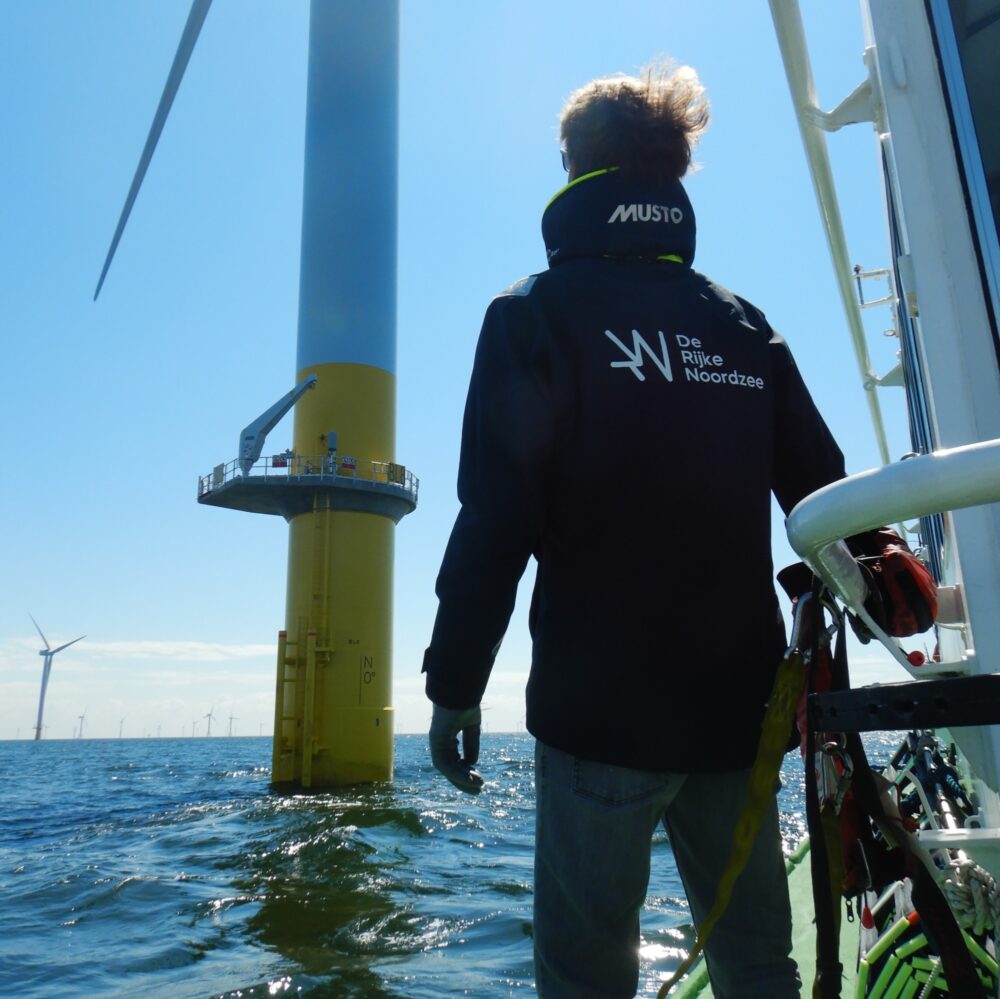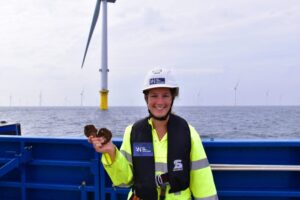“Every day I learn new things, I’m quite scientifically busy and, on top of that, I have a clear and concrete goal that needs to be achieved: those reefs need to be put in the water,” Frank says when asked what appeals to him about his work. He calls his work for The Rich North Sea groundbreaking. Renate especially likes the diversity of the work. “For example, I get to go out to sea to take measurements, but I also write the plans, hold discussions to get things done, or collect literature for our Toolbox (where we store and share all our knowledge). Lots of variety between broad and specific work, and between different sectors.”
For both Frank and Renate, the offshore days, that is, at sea, are without a doubt the most fun and impressive. “The preparations for a project often take several months to a year. Then you have to put all these preparations into practice during a few days at sea. Very hectic, but also very rewarding when it works,” says Frank, who mainly deals with issues such as coordination, planning and finances. Frank does this so that ecologists like Renate can focus on the most important question: how best to help nature in wind farms. “And I really appreciate that about Frank,” Renate winks at her colleague. “Of the days at home behind the laptop I will remember little later, but the offshore days in wind farms I will continue to cherish. Those are incredibly instructive and important to have a good idea of the things you talk about every day.”
Of the days at home behind the laptop I will remember little later, but the offshore days in wind farms I will continue to cherish.
There is still so much to learn underwater
Renate explains that she has been out to sea this year to see how the flat oysters in Borssele wind farm, which were released there in October 2020, are doing. “We put the oyster tables down for the first time on the erosion protection of wind turbines and now it turns out that this innovative concept works very well and the oysters are doing well. We also took photo and video images using a remotely operated vehicle, and took water samples for our research on the so-called ‘environmental DNA’. With this we monitor biodiversity around wind turbines,” says the ecologist. But that’s not all: at sea, cod were also fitted with transmitters for research, tagged lobsters were released, checked for oyster larvae, and artificial reefs and cage structures were placed on the seabed.
So there is some pretty hard work during the offshore days, because there is still a tremendous amount to learn. “If you look underwater, there is still so much unknown. With our work we can lift a corner of the veil, unravel the secrets of the North Sea,” Frank says enthusiastically. Renate adds: “Especially at sea, it is really possible to see what wind farms can do for nature.”
Working at sea gives me a certain sense of futility.
Renate and Frank are not only delighted with the work, they also love the fact that they can get to work on their passion: the North Sea. “Working at sea gives me a certain sense of nothingness,” explains Frank, who has a maritime background. “The sea is immense, both in terms of surface area and content. And you can plan the work so well, but if the weather doesn’t cooperate, for example, it simply won’t happen. I think that overwhelming power has something magical about it.”
As a marine ecologist, Renate, who is also an enthusiastic diver, naturally loves the North Sea. Especially the animals that live there. “I love diving in the North Sea and admiring the beautiful animals that live there.” She doesn’t have one specific favorite animal, but she does love nudibranchs. “That might sound crazy if you only know them from on land, but underwater they are really beautiful. There are so many different species and they are not always easy to spot. But that’s what makes it a fun challenge.”
“Many friends think that the sea is simply just a sea. But it goes so much deeper and it is so much more complex,” Frank says when asked what those around him think of his work. So he tells his friends and family a lot about the work he does every day. “That creates a kind of awareness and also often results in fun discussions, with angles that sometimes I hadn’t thought of myself yet.” Renate’s surroundings have not necessarily changed their view of nature in the North Sea, she thinks. If only because, as an avid wreck diver, she already talked about it a lot before she started working for The Rich North Sea. “But,” Renate notes thoughtfully, ”I do believe they have started to look differently at the energy transition and the effects of wind farms at sea.”
Extraordinary how much such a small team gets done
“The North Sea connects the entire team of The Rich North Sea,” Frank concludes. “The passion and dedication of all colleagues is so special to see. Everyone has a special bond with the North Sea and wishes her well. You can see that in the way we work together, communicate and interact as a team.” Renate fully concurs. “It’s very special how much we get done as a small team.”
Asked what they finally wish for the North Sea, they quickly have their answer ready. “A healthy life full of flora and fauna,” smiles Frank. Renate concludes, “I wish for the North Sea to become more widely known, so that it gets the love and appreciation that people also have for above-water nature.” And with this great motivation, they enthusiastically continue their work for The Rich North Sea.


